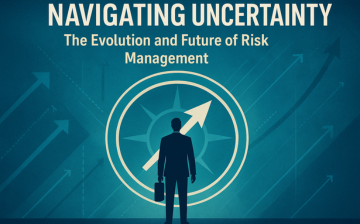
The Evolution and Future of Risk Management
Navigating Uncertainty: The Evolution and Future of Risk Management

Amandeep Singh Rajput
Scholar, Global Risk Management Institute
Embarking on a Journey Through the Evolution of Risk Management and Its Contemporary Challenges
Early Beginning
Since the dawn of civilization, risk has been an omnipresent threat to humanity. The rich history of managing these risks is deeply intertwined with our collective quest for progress and our evolving understanding of the world around us. The long tradition of risk management is entwined with our shared experience, mirroring our constant quest for advancement and our changing perception of the world’s frameworks. This exploration delves into the fascinating development of risk management, tracing its path from ancient intuition to the sophisticated frameworks of today.

From Tradition to Transformation: The Evolution of Risk Management
The intuitive methods for risk management were used by early civilizations long before formal structures were formed. These communities naturally managed uncertainty, from developing flood control measures in Mesopotamia to diversifying crops in the days of Egypt. Precursors to insurance arose as trade expanded, enabling people and groups to share and reduce financial risks. The groundwork for the later codified systems was established by these preliminary actions. Specialised risk management entered a new era at the beginning of the 20th century. Risks associated with their respective fields have been determined and mitigated through the establishment of particular processes by industries such as finance, engineering, and safety. However, the vast majority of the media coverage was reactive, attempting to mitigate losses after they happened. Minimising risks and relying on insurance were popular tactics that revealed a lack of understanding of what interconnected hazards were.
Proactive management of risks has grown equally important as companies have become more complicated and global hazards have escalated. The previous proof of identity, assessment, and administration of risks became increasingly significant in the late 20th-century business operations. This comprehensive perspective fostered a proactive risk-mitigation culture. Frameworks for enterprise risk management, or ERP, have grown into significant instruments for incorporating risk management into core business processes and decision-making processes. As a consequence, the company’s preparedness and resilience were substantially enhanced.
Embracing Technology & Quantitative Tools
The 21st century has brought about significant improvements in risk management attributable in significant measure to technology and data analytics. For companies to more effectively recognise, assess, and predict risks, sophisticated methodologies like machine learning and quantitative risk assessment are being employed with greater frequency. This makes it possible for organisations to implement preventative measures to address potential threats and make well-informed choices.
Current Challenges, Emerging Risk & Frontiers: Introduction of Disruptive Technology
The constantly shifting ecosystem provides with it both fresh dangers and possibilities for risk management. Robust security measures have significance in the context of growing cyber threats, an
Increased interconnection necessitates improved operational resilience. It is becoming more and more important to address the potential hazards brought about by climate change and incorporate issues related to sustainability into decision-making. Disruptive technologies that include Artificial Intelligence (AI) and increasing stakeholder worries regarding Environmental, Social, and Governance (ESG) components are contributing to a paradigm shift in the risk management landscape. While AI may be automated and successful, issues surrounding control and accountability are raised by its opacity and potential biases. Comparably, ESG variables require proactive management of social justice worries, climate risk, and ethical sourcing techniques. Traditional risk frameworks have to be modified to include these new hazards, requiring an expanded and proactive approach. To safeguard organisational resilience in the face of these complex problems and reach an agreement in this increasingly complex environment, interaction among risk professionals, data scientists, and social Responsibility experts is needed. Contemporary risk management extends beyond straightforward risk minimisation, emphasising organisational resilience development and even seeing opportunities inside potential hazards. This preventative approach makes sure that businesses flourish in an unpredictable environment.
The Risk Management Journey Continues: Looking Ahead

The above overview barely scratches the outer limits of the complicated and ever-evolving subject matter of risk management. The significance of this movement will undergo shifts and adapt to new opportunities and challenges as well. Organisations may successfully move through the uncertain waters of the future by acknowledging the rich historical context and employing the most sophisticated musical instruments at their disposal, thereby transforming risks into opportunities for development and achievement.
References:
- Power, M., Barnes, R., & Marchewka, J. T. (2017). Risk management: A structured approach. Routledge.
- Chapman, C. J., & Ward, S. T. (2015). Enterprise risk management: Integrating risk into strategy. Routledge.
- COSO. (2017). Enterprise risk management integrated framework. Committee of Sponsoring Organizations of the Treadway Commission.
Bibliography:
- Embrechts, P., McNeil, A., & Strauman, D. (2002). Mean-variance portfolio theory and risk measurement. Financial Engineering Series.
- Howard, N. J. (2014). Identification and analysis of special hazards. John Wiley & Sons.
- Aven, T. (2020). Risk assessment and risk management. John Wiley & Sons
For any queries please fill the form
Is a Career in Cybersecurity Right for You? Here’s What You Should Know
You may also like

How to Choose the Best Cybersecurity Course in Delhi for Your Career

PG Degree for Housewives & Career Re-Starters: A New Beginning


